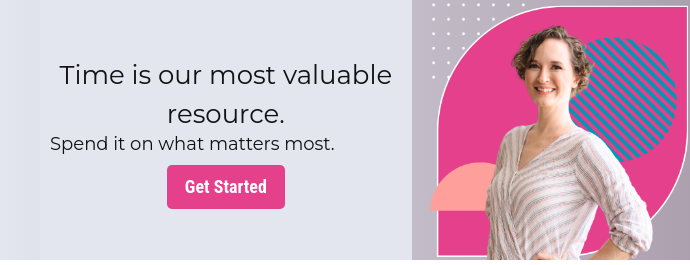Hi. I’m Heather, the COO and co-owner of Queen of To Do.
Overstimulation: How Your Space Shapes Your Sanity with Queen of To Do
Environmental stress doesn’t just wear you down, it wires you up.
From cluttered rooms to constant noise, what surrounds you shapes how you feel. Let’s talk about how to create a space your nervous system can actually rest in.
.png?width=852&height=259&name=In-Blog%20Landscape%20Template%20(8).png)
Let’s be honest: the world is a lot right now.
The noise, the notifications, the ever-growing task list… it’s no wonder so many of us feel nervous, anxious, or overwhelmed. Overstimulation has become a constant companion (the kind that always overstays their welcome) - especially for those trying to juggle work, family, caregiving, or simply existing in a world that never pauses.
But it's not just "a lot". It’s real. It’s exhausting. And it’s quietly taking a toll on our health.
What Is Overstimulation, Really?
Overstimulation happens when your nervous system is flooded with more input than it can process - sensory, emotional, digital, even internal pressure. Think: a cluttered room, ten open tabs, the group chat is going off, and your brain trying to hold it all at once.
You're not weak. Or "too sensitive". This is just how your system works.
Dr. Elaine Aron, who coined the term Highly Sensitive Person, notes that about 15–20% of people have nervous systems that deeply process information. And while everyone can become overstimulated, sensitive or not, we’re reaching collective overload. A 2024 report from the A 2024 report from the American Psychological Association found that 71% of adults experience physical or emotional symptoms of stress multiple times per week - overstimulation cited as a growing factor.
Though we wish it were this easy, it isn’t about “just turning your phone off.” It’s about what happens when your environment no longer helps you regulate.
The Invisible Weight of the Environment
Ever walk into a room and immediately feel your shoulders tense, or forget what you were doing mid-thought because the space just felt off?
That’s your body picking up signals long before your brain can make sense of them.
When your environment is loud, cluttered, or chaotic, it quietly keeps your nervous system in “alert mode.” It’s harder to focus, harder to rest, and harder to come down from the day.
Even in our homes - our safety zone - can become overstimulating without us even noticing. can become overstimulating without us noticing. Dirty laundry that’s been waiting for weeks, the toys underfoot, the unopened mail on the counter… it all becomes noise your brain keeps scanning for resolution.
Signs of Overstimulation
You feel tired even when you sleep.
You snap easily - at others or yourself.
You keep jump between tasks but don't finish any.
Your body feels tight: jaw, shoulders, gut.
Small decisions feel huge.
You need silence, but never get it.
Creating Space for Calm - On Your Terms
Ok so, solutions - not in a “clean your house and your soul will follow” kind of way. But small, meaningful shifts that can help to protect your sanity kind of way.
1. Reclaim One Corner
You don’t need a whole room. You just need a spot, a designated one. A cozy seat and soft lighting. A clutter-free nightstand or desk. A place where your body doesn’t feel like it has to do anything. This is your reset zone.
2. Close a Loop
Pick any visual stressor (a pile of socks to be matched, a stack of unopened mail, a sink of dishes), and consider completing just that one thing. Not because it’s urgent or important, but because sometimes, clearing one small thing can quiet the noise a bit. If it helps, set a short timer - 5 - 10 minutes, max.
3. Reduce the Noise
Let’s hear it for Do Not Disturb mode! Or finally putting your phone in another room. If your brain never gets a break from input, it won’t know when to rest. The fewer the pings, the more space you have to think clearly and breathe deeply. And also, noise-cancelling headphones are wonderful.
4. Update the Lighting
Bright, overhead lights tell your brain to stay alert. Instead, try warm bulbs, natural light, or task lighting (smaller, focused lights like desk or reading lamps that don’t flood the whole space).
5. Manage the Mental Tabs
Sometimes the loudest clutter is in your head. The vet appointment. The unread email. The summer camp registration. Write it down. Make a list. Or, delegate it. Mental load lightens when you stop carrying it alone.
It's Not You. It's the Noise.
We’ve all been told to “just deal” with the mess, the stress, the nonstop input - but pretending we’re fine doesn’t make things easier. It just delays the crash.
At Queen of To Do, we don’t believe that managing everything alone is a badge of honor. We believe that asking for help is a power move. And that setting your environment up to care for you is one of the most important forms of radical self care there is.
You don’t need to do it all.
You just need to know you don’t have to.
When You’re Ready
If your environment isn’t giving you peace, our team is here to help you reclaim space that truly supports your nervous system: one drawer, one room, one routine at a time. We got this.
Your environment should work for you - not against you.
.png?width=1200&height=400&name=Untitled%20design%20(28).png)

.png?width=200&height=200&name=In-Blog%20(21).png)





